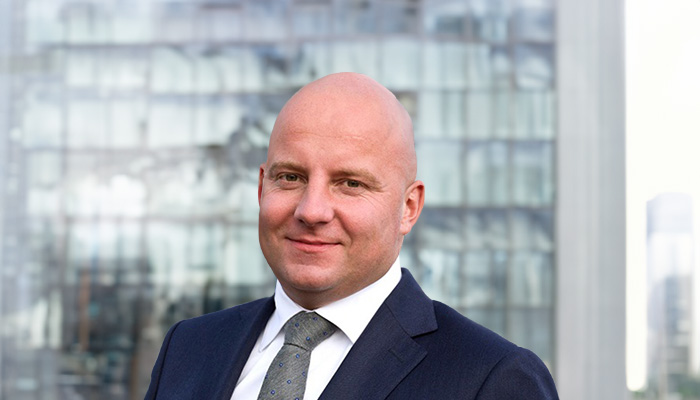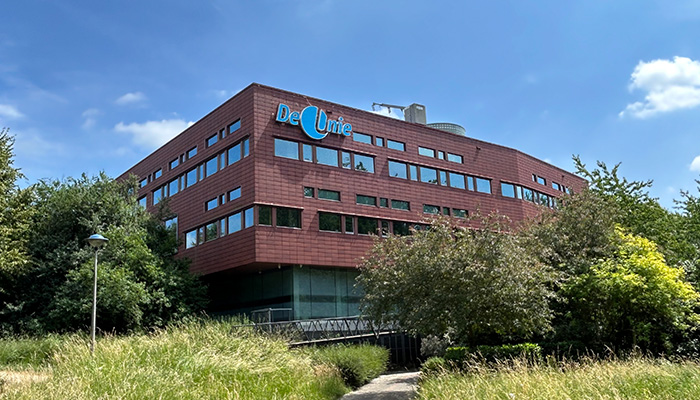
Look for similarities, instead of highlighting and magnifying the differences. That is what De Unie strives for: always has, but now that polarization in society – and at the negotiating tables – seems to be increasing, we are trying more than ever. Chairman Reinier Castelein looks back on the past year and looks ahead to 2024. He explains how De Unie working on connection. 'The terms collectivity en secure live in society, but people often think about it in too one-dimensional terms. We don't do that – and we notice that more and more people appreciate us for that.”
Good year for collective labor agreements. However?
Around this time last year, Reinier expected 2023 with difficult collective labor negotiations. 'That expectation has certainly come true: negotiations have been more robust in recent months, but we have concluded many collective labor agreements with wage increases that were unthinkable in previous years. We have made significant inflation repairs. Good in itself, but we gradually noticed major differences of opinion between us and the other unions. For example, on topics such as “levelling” and “wage floors”: in our view, too easy a reflex at times when many people are having a hard time financially, and not in the interests of our supporters. That is why we have not signed ING's new collective labor agreement. They practice wage policy in The Hague. We shouldn't do that at the collective labor agreement tables.'
Middle incomes are not the strongest shoulders
The number of people below the poverty line is growing rapidly, but even above it it is becoming increasingly difficult to make ends meet. Everyone seems to agree that something needs to be done. The consensus is often: high earners have to make concessions. “But these can never be people who are employed and covered by a collective labor agreement,” says Reinier. 'People with an income slightly higher than one and a half times the average are not necessarily rich. That sounds good in a debate, but it's just not right at all.'
'For example, when it comes to not increasing fuel taxes, you often hear: the rich mainly benefit from this. Easy to score, but incorrect. In the vast majority of cases, people with two cars in front of their door are not wealthy collectors, but dual-income households who both need them for their work. Not the people to catch, if you ask me. By the way, I miss a real discussion about a smaller government and a reduction in taxes.'
Renewed appreciation
The upper middle income groups are in the corner where the blows fall. 'Resisting against this unsubtle development De Unie himself. And that is appreciated: at the end of last year the members suddenly poured in, and this continued every month this year - our membership has been growing for 15 months in a row. It is possible that there is a second explanation for the membership growth. Trust in politics – traditionally the institution where people feel heard and can exert influence – is rapidly eroding. People still have a voice in the union. And we repair income, as the government should actually do. I can imagine that people therefore look to us for their democratic salvation.'
Social security in a broader perspective
The nuance is missing in many more discussions, Reinier believes. 'For example, look at livelihood security, one of the most important election themes a few weeks ago. Politicians only talk about income and expenditure, but there are a lot of other factors that influence it to exist of people and restrict their freedom. The rules, points of attention and expectations are piling up.'
'Solar panels are good for the climate and save money in the long term, so of course we have them installed. In the past, the relaxed advice was to wash during off-peak hours, because this was cheaper. If you really want to pay attention to your energy costs, you have to keep an eye on when the best wind and sun hours are every day - with all the apps, dashboards and data we have at our disposal. That may ultimately yield the promised savings, but now it costs a lot: time and brainpower, which we can no longer use for other things in our lives.'
'I think that is a loss of well-being. The uncertainty about expensive energy, the difficult search for a charging station, having to constantly pay attention to the forecasts: it turns certain social security upside down. It's not just about money, it's also about the way of life. More and more certainties are disappearing, without immediately being replaced by reliable alternatives. As a result, we dig deeper and deeper into our own world. Ultimately, this affects the cohesion in society.'
No alienation, but connection
'Seven years ago I wrote a book entitled Well-being is the new prosperity. I think that theme is more topical than ever: where do we get our well-being, now that our existence is under pressure from all sides? We have to find an answer to that together. It is important that we come closer together and no longer allow ourselves to be polarized. That is why we will continue to focus on meeting each other physically in the coming year, for example at anniversary events. Last year we also organized an opposites dinner, where people with completely opposite views talk to each other. Not to agree with each other, but to see and hear each other – to gain respect for each other and other opinions.'
'In addition, we will of course continue to work for higher wages, good pensions and lower costs, in order to provide relief. Also for employees of companies that are under social fire, such as KLM and Tata Steel. And as long as more and more people find us, we feel confirmation that we are doing it the right way.'



